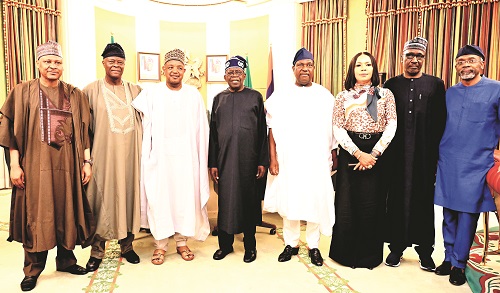The Federal Government is set to present financial calculations to Labour today, backing its proposed minimum wage offer.
This follows President Bola Ahmed Tinubu’s directive to the Minister of Finance and Coordinating Minister of the Economy, Wale Edun, to assess the cost implications.
The President issued this directive during a meeting with the Federal Government’s negotiation team. This move comes after the Nigeria Labour Congress (NLC) and the Trade Union Congress (TUC) announced a one-week suspension of their strike following the President’s intervention.
A Tripartite Committee has been convened to adopt an agenda, committing members to a week-long negotiation. The Senate has pledged to expedite the passage of a new Minimum Wage Bill once an agreement is reached.
The NLC and TUC commenced their strike on Monday in protest against the previous wage committee meeting’s outcome.
The Federal Government and private sector had proposed a minimum wage of N60,000, while Labour demanded N494,000. The strike resulted in the shutdown of the national grid and flight disruptions.
Minister of Information and National Orientation, Mohammed Idris, stated that President Tinubu instructed Edun to provide the necessary figures for negotiations with Labour. The meeting was attended by key government officials, including the Secretary to the Government of the Federation (SGF), George Akume; Minister of Budget and Economic Planning, Atiku Bagudu; Minister of State for Labour and Employment, Nkeiruka Onyejeocha; and Group Managing Director of NNPCL, Mele Kyari.
Idris expressed gratitude for Labour’s suspension of the strike and emphasised the President’s commitment to a realistic and acceptable new minimum wage. He highlighted the government’s aim to balance wage increases with economic sustainability.
Labour leaders, including NLC President Joe Ajaero and TUC President Festus Osifo, cited the need to create a conducive atmosphere for uninterrupted negotiations. Their joint communiqué urged the Federal Government to commit to a concrete and acceptable national minimum wage, revert the electricity tariff hike, and abolish discriminatory electricity consumer classifications.
Osifo clarified that Labour is not rigidly fixed on the N494,000 figure. He stressed that their proposal is based on principles, and they expect the government to consider the minimum wage’s value from previous years when making their offer.
Senate President Godswill Akpabio assured that the legislative body would accelerate the process of enacting a new minimum wage law. He underscored the importance of considering the capacity of states, local governments, and the private sector to pay the new wage.
Akpabio expressed gratitude to Labour for suspending the strike and encouraged continued dialogue to achieve a resolution beneficial to all Nigerians.
As negotiations continue, the focus remains on finding a sustainable and realistic minimum wage that addresses the needs of Nigerian workers while ensuring economic stability.



